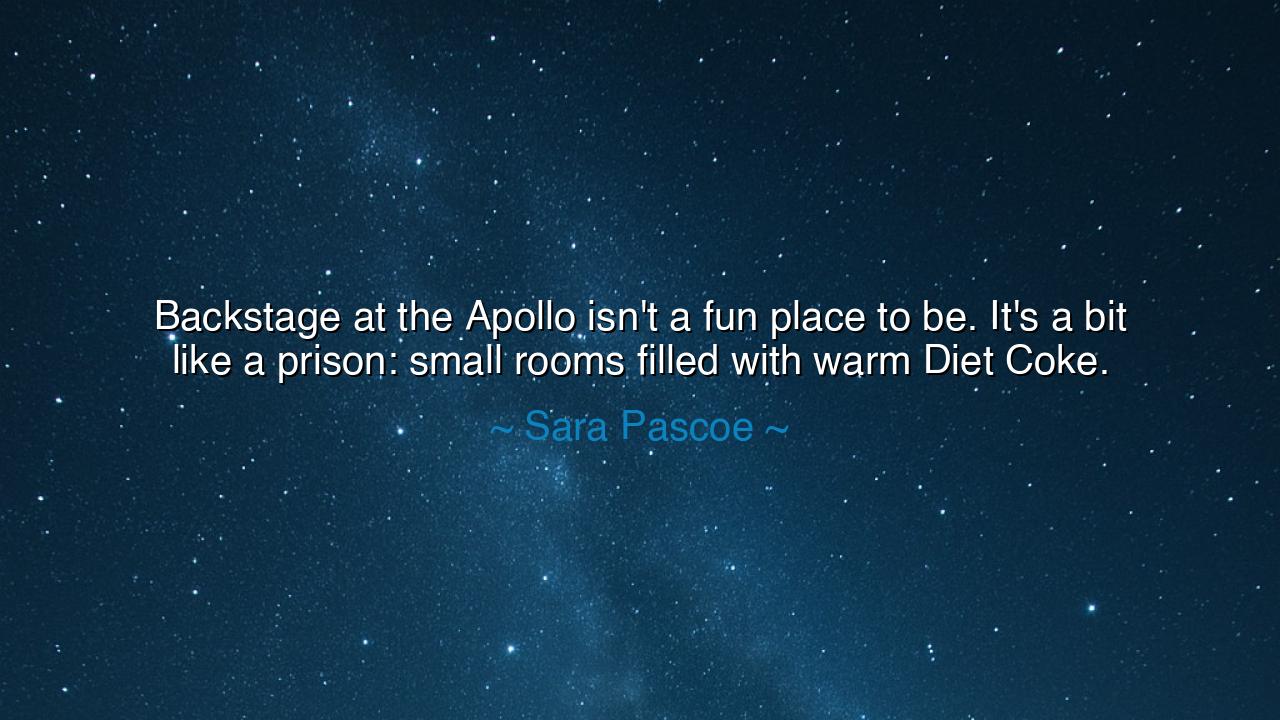
Backstage at the Apollo isn't a fun place to be. It's a bit like
Backstage at the Apollo isn't a fun place to be. It's a bit like a prison: small rooms filled with warm Diet Coke.






The words of Sara Pascoe—“Backstage at the Apollo isn’t a fun place to be. It’s a bit like a prison: small rooms filled with warm Diet Coke”—may seem light, almost flippant, yet within them lies a truth known to all who chase art, ambition, and applause. Beneath the surface humor, Pascoe unveils a profound contrast between appearance and reality, between the dazzling glow of the stage and the dim solitude that lies behind it. It is a statement both comedic and philosophical, one that captures the loneliness and confinement that often dwell in the heart of performance, even as the world sees only the sparkle of success.
To call the backstage of the Apollo Theatre—one of Britain’s most iconic comedy stages—“a bit like a prison” is not to speak of bars or chains, but of the invisible boundaries of expectation. For every performer, that narrow corridor before the lights go up is a place of both waiting and confinement: a space where the spirit wrestles with fear, anticipation, and self-doubt. The “small rooms filled with warm Diet Coke” become symbols of the compromises that accompany fame—the loss of glamour, the fatigue behind laughter, the quiet truth that even joy, when commodified, can grow stale. In her characteristic wit, Pascoe transforms an ordinary observation into a reflection on the human condition itself.
The origin of this quote lies not only in her experience as a comedian but in the age-old paradox of artistry: that those who make others laugh often labor in silence, and those who appear free on stage may live within unseen walls. This is the duality of performance—the laughter of the many built upon the solitude of the one. Pascoe, like many artists before her, understands that creation often demands confinement, that the light of the stage is born from the shadows of preparation. Her prison is not of cruelty but of necessity—the price of excellence, the cost of art.
This truth was known even to the ancient actors of Greece, who performed in open-air amphitheaters yet endured the same hidden anxieties. Behind the masks of comedy and tragedy, they too faced isolation and expectation. The philosopher Seneca, tutor to emperors and dramatist of Rome, once wrote that “we suffer more in imagination than in reality.” The waiting before the act, the stillness before the roar of the crowd—these moments are the unseen crucible where the spirit is tested. So it is with Pascoe’s “small rooms”: they are the spaces where courage gathers itself, where humor is forged from nervous energy, and where the performer’s heart must learn to thrive without applause.
In another sense, her words reveal the timeless struggle between illusion and authenticity. The audience sees grandeur; the performer sees cramped rooms and lukewarm drinks. The world believes success is golden; the one who lives it knows it is often gray. Yet Pascoe’s strength lies in her humor, which transforms complaint into comedy and disillusionment into wisdom. By comparing the backstage to a prison, she invites us to laugh at the absurdity of ambition itself—to recognize that even within confinement, there can be levity. Her jest becomes a form of liberation: for those who can laugh at their own prisons are already free.
Consider also the story of Charlie Chaplin, who, in his early years, performed in ragged theaters where dressing rooms were barely more than broom closets. He, too, lived the contradiction between poverty and performance, anonymity and applause. Yet from those humble spaces arose some of the greatest art the world has known. Chaplin, like Pascoe, found in the hardships of performance not despair but material—not prison walls, but inspiration. Thus, what Pascoe calls the prison of small rooms becomes, in truth, a workshop for resilience, a reminder that beauty often emerges from discomfort.
Let this be the lesson carried forward: do not be deceived by the glow of the world’s stage. Every triumph hides its labor, every smile its tension, every “fun place” its unseen toil. When your own life feels like a small room—stifled, narrow, filled with monotony—remember that such spaces often precede the moment of creation. Keep a sense of humor, as Pascoe does, for laughter is the key that unlocks even the smallest of prisons.
So, in the spirit of Sara Pascoe, let us learn to meet confinement with wit, to meet weariness with grace. For every “warm Diet Coke” is a symbol of imperfection—and yet, in that imperfection, life continues, art endures, and laughter survives. The great paradox of existence is this: even in the smallest, dullest places, the heart of joy can still be found, waiting to take the stage once more.






AAdministratorAdministrator
Welcome, honored guests. Please leave a comment, we will respond soon